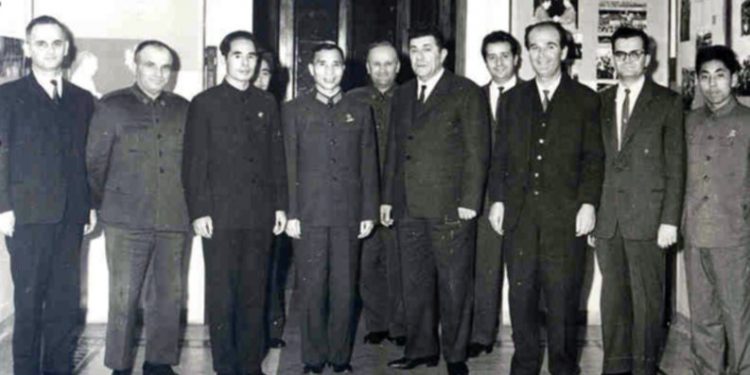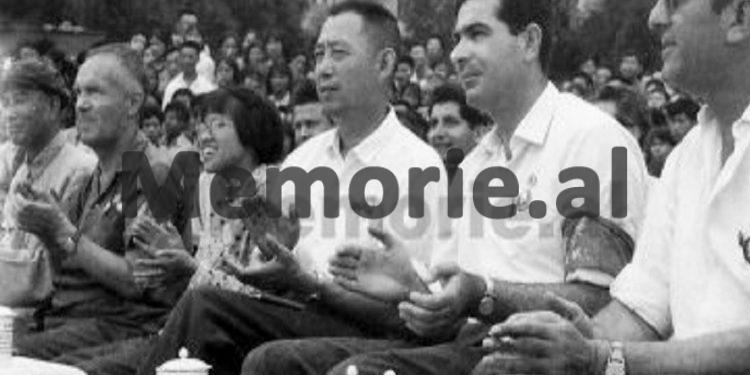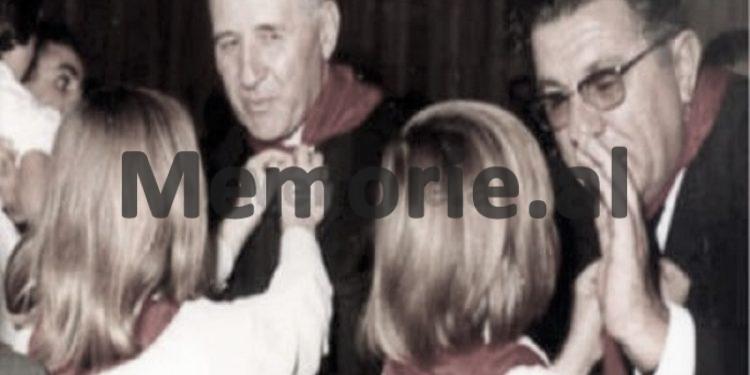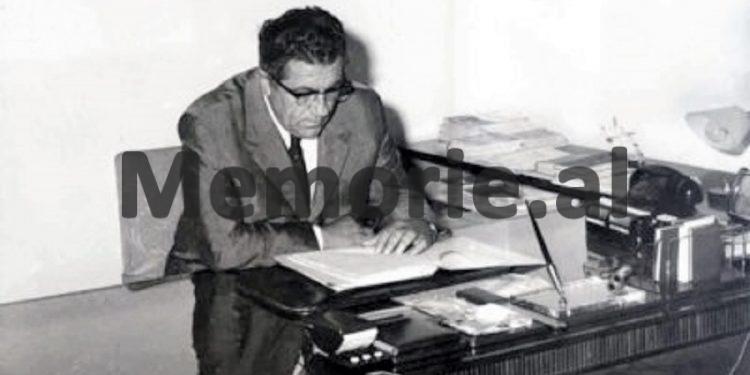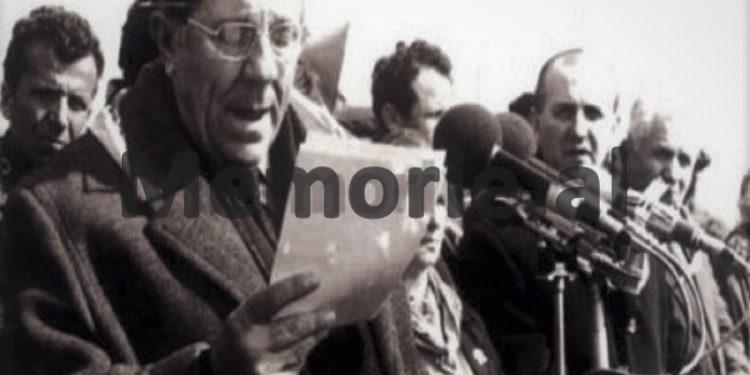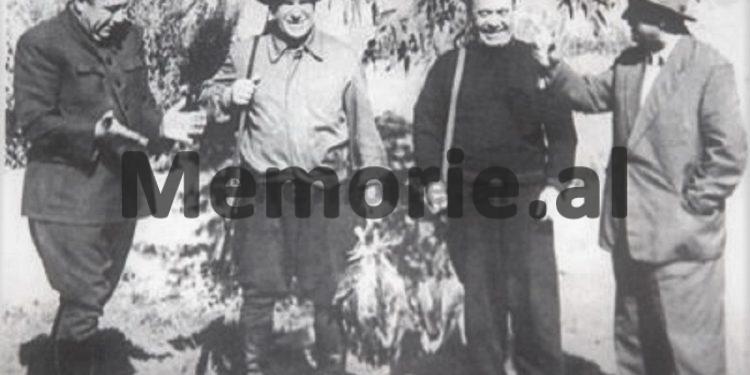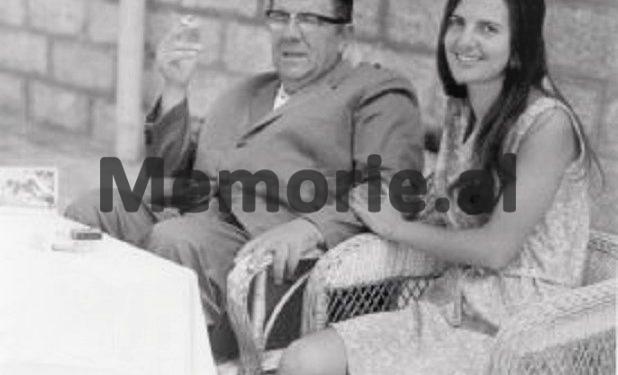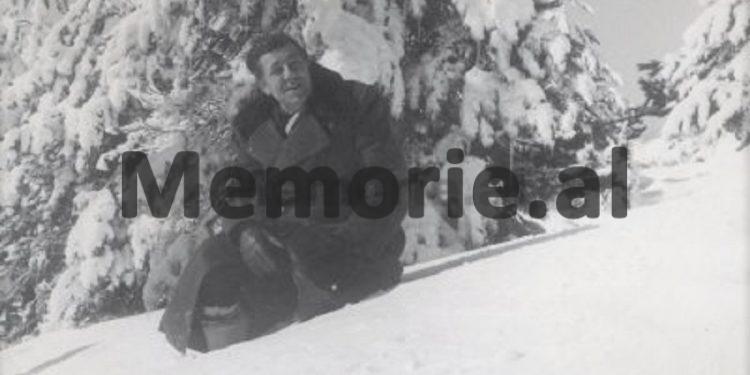Dashnor Kaloçi
Memorie.al publishes the full letter of the former Minister of Defense, Beqir Balluku to Enver Hoxha, dated September 18, 1974, sent from Roskovec where he initially suffered internment, accused of being “an enemy of the party and the people”. In the full 24 pages of that letter, Balluku explains everything to his former boss, starting from the period of the War, until the day he was there, away from friends and separated from family. And with the big mark as “politically shot” he begs Enver and the Party to put their hand on his heart and give him once again the opportunity to spend the few years of his life left to society socialist, giving his contribution even in working in manual labor …?!
His name became known during the period of the Anti-Fascist National Liberation War in the first half of the ’40s when he led the guerrilla units of the city of Tirana, and later as Commander of the 2nd Assault Brigade. After the end of the war, Balluku would be appointed to the post of Chief of the General Staff of the Army with the rank of major general, replacing General Spiro Moisiu. From that period until 1974, when his career lasted, Beqir Balluku would perform a number of high party and state functions, such as: Deputy Prime Minister, Minister of Defense, member of the Politburo, and MP in all legislatures.
Until the end of the 60s, he was considered one of the most loyal people of Enver Hoxha, which would provoke envy and jealousy on the part of Prime Minister Mehmet Shehu, who in the future saw himself de jure and de facto as the successor of Enver Hoxha. Balluku would gain a lot of credibility in Hoxha’s eyes for his gesture of loyalty to the top leadership of the ALP, when the latter were in a very delicate political situation at the Conference of 81 Parties in Moscow, where he (Balluku ) would declare to the Soviet ambassador in Tirana, Shikin, that; “If any unpleasant surprise happened to the Albanian leadership in Moscow, all Russian citizens in Albania would be executed without warning.” Even for this fact, after the break with the Soviets, the figure of Balluku would recognize an immediate increase in political career, until the most critical moment of the institution that Balluku represented, the abolition of the ranks of the Albanian army in 1967. The first rift between Balluk and Hoxha would take place in 1967, when the plenipotentiary of the Ministry of Internal Affairs for the army, Major General Halim Xhelo, would write the famous anonymous letter to Enver Hoxha, in which he protested against the stripping of the Albanian army from the rank system.
After the discovery of Xhelo’s letter and the imprisonment of Xhelo, Hoxha and especially Shehu, would see with great suspicion its true authorship, as it was written under Balluku’s nose and if he did not hide behind Xhelo, in the worst case had been aware of its existence. At least that was alluded to at the time in the corridors of the Ministry of Defense and the Central Committee of the ALP. If this were not enough, from the late 1960s and early 1970s, frequent clashes between Beqir Balluku and his deputy, the Chief of the General Staff of the Army, Lieutenant General Petrit, would begin. Dumes, which would provoke several meetings of the Politburo, especially for this quarrel between the two highest military figures. The Balluku-Dume quarrels and quarrels would be so frequent that Beqiri himself would ask Enver Hoxha in some extraordinary meetings to resign from the post of Minister of Defense. Which at that time was categorically rejected by Hoxha?
Another culminating moment for Balluku who seemed to be “filling the cup”, which cast doubt on many but for the Hoxha-Shehu duo, would be the visit of Beqir Balluku at the head of a delegation composed of senior Army exponents in China in 1972. During this visit, the Chinese Prime Minister, Chu En Lai, would reject the official request of the Albanian state for sending military technology materials, stating clearly: “No matter how many weapons we give you, Albania cannot withstand an attack. military of the Soviet Union. Your best way to resist is to retreat to the mountains, or as it is called in military language, “Sliding Theory”. “You have to create a Balkan (Tirana-Belgrade-Bucharest) anti-Moscow axis.”
It is said that Security figures immediately rush to report this fact to the leadership in Albania, adding here another mysterious evidence that Beqir Balluku, secretly went to the Soviet embassy in Beijing last night and negotiated with the ambassador and the KGB chief for China around a possible coup d’état in Tirana in cooperation with 25,000 Soviet landers (this accusation of the State Security). As if all this were not enough, Beqir Balluku, a few hours before his arrival in Beijing, would meet incognito at the Bucharest airport, the Minister of Defense of Romania, General, Ioan Ionita. The details of this meeting have also remained vague.
Meanwhile, only two years after his visit to Beijing, the assets of the infamous Army of August 1974, developed in the villa of King Zog in Durrës, would begin. In that meeting that lasted two days in a row, according to Enver’s order, Mehmeti and Hysniu invited all Balluk’s subordinates to talk and discuss about “his hostile activity”. It would be exactly the content of the “Black Theses”, the one that would cost very dearly to the three most important figures of the Albanian army; Beqir Ballukut, Petrit Dumes and Hito Çakos.
It is worth mentioning the fact that on the day of Balluk’s declaration as a “traitor and coup”, the former Chief of Army Security, Halim Xhelo, who was serving his sentence in Burrel prison, would mysteriously die in his cell. (It was said that that day, he lost hope that one day he could be released with the help of Balluku). While the Plenum of August 1974, would be the warning trial for the military caste, who only a few days later would feel all the rage of Hoxha, a rage which would lead to the death of three a year later. But before that happened, Beqir Balluku was interned in the small town of Roskovec, from where, on September 17, 1974, he would send a long letter to Enver Hoxha, where in its 24 pages he would to explain everything to his boss who had served him devoutly since the time of the War. And that letter sealed in an envelope, Balluku entrusted only to his eldest son, Liberation, who brought it by hand to the letter-complaint office at the Central Committee of the ALP.
What is written in that letter, how Enver considered Beqiri’s self-criticism, and Mehmet Shehu’s notes on it, becomes known through these documents that Memorie.al is publishing in full exclusively in this next dossier, while what is worth It is emphasized that Beqiri himself never learned the truth if that letter reached the hands of Emver Hoxha …?! And so, he must have escaped this life with the great pledge that his boss had not received the letter, otherwise he would have at least spared his life. This is confirmed by the family members of Balluku, who also before the discovery of the letter, had and defended the same version as their father.
follows from the previous number
Balluku: I twice asked you to resign as a minister
I, noticing the defects of this structure as well as the predisposition of the comrades, especially after the meeting of the Bureau for Petrit to be charged more, and the criticisms and remarks in my address the transition to the first structure, made me request my removal twice in a row from the post of Minister and the rise of Petrit, because I thought that his being in this post is more adaptable than the Chief of Staff and in his place to go a new and promising friend, I now see that this issue is probably the first, while the motivation that I did at that time, that I do this motivation for health issues, is not the first, but the last, I did not raise this problem directly because as related to me, this is wrong. Asking for my resignation from the post of Minister, I honestly say that I never thought of Petrit leaving, despite the duality that existed between us and that I remain.
I have always thought and worried if I am doing my duty, because my health has prevented me from following in practice the exercises and duties of the army in different seasons of the year, especially those with a field character.
Despite the views and criticisms I have made of Petrit, I have never denied his skills, experience and long service in the army, so by making this proposal I have made with full conscience how about his age, his health condition and experience long in the General Staff, he has been adapted for the post of Minister. As for the labor sector where I could work, I told Comrade Hysni that I was ready to think of the Party, but I personally thought that I could serve in the Prime Minister’s Office where I could deal with the MCR military sector, of course I thought that in this case this sector could be reorganized and supplemented to cope with the running of the work and the preparation of state bodies.
At the end of this letter I address the Party and Comrade Enver with a sense of full conscience and remorse, for the grave mistakes and guilt I have committed, fully convinced of the justice of the punishments taken against me, and I beg her fervently to forgive me for the damage I have done.
The Party and Comrade Enver at the age of 24 shook my hand, educated and led me in the noble struggle for the liberation, construction and defense of our socialist homeland, and today all my mature age and long service in the Party, I fell victim to the pressure of bourgeois-revisionist ideology, and at this tragic moment of my life she made every effort to correct me from this grave disease, this goal was not achieved through my fault.
Balluku: I understood the mistakes, please forgive me
Although I now have no moral right to make the slightest request to the Party, yet I am praying to the great heart of this noble mother, to forgive me for the mistakes and grave sins I have committed, and not to line me up in the ranks of her enemies, but to regard me as the former son who has made a grave mistake and who seeks her powerful hand, to come out of the hated mire of the bourgeois-revisionist world and walk to the end of my life with its cause as a patriot.
I warmly ask the Party to spend this short part of my life on purpose in life, therefore to give me the opportunity to spend it in the bosom of our socialist society, with the desire of ardent willingness to give myself a small contribution to the battle for the socialist construction of the country wherever it is seen as reasonable. Even despite my age and health condition, I am ready to work hard in order to darken this part of my life not on the other side of the barricade, but on the side of the Party and the people, because from their interests and cause, there was no and there will be no motive to stop me, I from the collapse and paralysis of foreign ideology want to rise not to stand in its sludge, but to move forward as an ordinary citizen and patriot on the glorious path led by the Party and Comrade Enver, this is my only request at this tragic moment of my life. I assure the Party and Comrade Enver, that in spite of the mistakes and faults I have made for the reasons I have elaborated above which I condemn with full conscience, that in my heart and mind the love for the Party has not been and will never be extinguished and Comrade Enver.
I beg the Party to give me the opportunity to start a new life, I beg you with its sharp sword to cut from the roots the bad part of my life, to be in the grave not as the enemy of the Party of the people, but as a citizen simple and patriotic and that my children and my whole family circle who are like bone to flesh with the Party and who severely condemn my mistakes and guilt, walk the path of life as its sons and daughters and not as class enemies.
I end this letter with a shocked conscience and remorse for the mistakes and guilt I have made, convinced that the damage I have done to the Party is not even washed away with my life, which is at the disposal of the Party at all times. I solemnly affirm before the Party and Comrade Enver that in spite of all the mistakes and faults I have made, in my mind and heart at present not only has not been extinguished, but on the contrary, hatred against the imperialist-revisionist enemies has increased and faith and determination to fight won against them, both in the political, ideological field and to crush and annihilate them in armed struggle.
Long live the Party
Long live Comrade Enver
With deep respect to the Party, K.Q and Comrade Enver
Roskovec, on 18.9.1974
Former Party member
(Beqir Balluku)
NOTES OF MEHMET SHEHU LETTER OF BEQIR
According to these archival documents that we have, after Enver saw and read the letter, he sent it to Mehmet Shehu, Hysni Kapos, Ramiz Alia, Rita Markos and Haki Toska. This is also confirmed by the note of Enver Hoxha’s chief of staff, Haxhi Kroit, who in the cover letter wrote: “Letter of Beqir Balluku dated 18.9.1974, where he tries to explain his guilt for the hostile work and asks to he is given the opportunity to work as an ordinary citizen in these last years of his life.
Friends Enver, Mehmet, Hysni, Haki, Ramiz and Rita found out. (Haxhi Kroi)
While it is not known, at least officially how Hysniu, Ramizi, Hakiu and Rita Marko reacted to Balluku’s letter, Mehmet Shehu made many notes on that letter on almost every page where she wrote:
- Demagoguery, hypocrisy, gossip, fear, stupid defense. (These are written with Mehmet’s writing at the top of the letter)
- How, why?
- What concepts?
- Cunning or hostile work?
- Isn’t this hostile work?
- Where did you seek to go as an arrivist?
- Lying. Beqiri in active (June 1974), does not even mention the existence of secret material.
- Why this tendency of Beqir, coward in this case? Where has he been afraid of this …?!
- Where you wanted to go.
- What fills our minds, the victim is a defendant and not Beqir Balluku.
- Yes, if we eat cheese soap?! Yes, our Party has never done that.
- What about other crimes, abuses of official position, benefits from state property, etc.?
For Comrade Enver
These two relations have been made by two former deputy political directors of the army who have worked for a long time in the Political Directorate.
I instructed Dilaver to call them and explain how the work of Soviet revisionist literature was sent, which was mostly sent to the army and used for political, ideological and military education./Memorie.al
- X. 1974 Hysni Kapo




